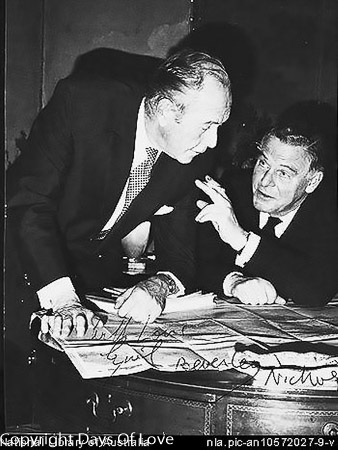 John
Beverley Nichols (9 September 1898 – 15 September 1983) was an English author,
playwright, journalist, composer, and public speaker. He was friends with
Noël Coward.
John
Beverley Nichols (9 September 1898 – 15 September 1983) was an English author,
playwright, journalist, composer, and public speaker. He was friends with
Noël Coward.Partner Cyril Butcher
Queer Places:
University of Oxford, Oxford, Oxfordshire OX1 3PA
Marlborough College, Bath Rd, Marlborough SN8 1PA, Regno Unito
Allways, Glatton, Huntingdon PE28 5RR, Regno Unito
Merry Hall, 19 Agates Ln, Ashtead KT21 2NG, Regno Unito
Sudbrook Cottage, Ham Gate Ave, Kingston upon Thames, Richmond TW10, Regno Unito
1 Ellerdale Cl, London NW3 6BE, Regno Unito
14 Ovington St, Chelsea, London SW3 2JB, Regno Unito
St Nicholas Churchyard
Glatton, Huntingdonshire District, Cambridgeshire, England
 John
Beverley Nichols (9 September 1898 – 15 September 1983) was an English author,
playwright, journalist, composer, and public speaker. He was friends with
Noël Coward.
John
Beverley Nichols (9 September 1898 – 15 September 1983) was an English author,
playwright, journalist, composer, and public speaker. He was friends with
Noël Coward.
Between his first book, the novel Prelude, published in 1920, and his last, a book of poetry, Twilight, published in 1982, Nichols wrote more than 60 books and plays. Besides novels, mysteries, short stories, essays and children's books, he wrote a number of nonfiction books on travel, politics, religion, cats, parapsychology, and autobiography. He wrote for a number of magazines and newspapers throughout his life, the longest being weekly columns for the London Sunday Chronicle newspaper (1932–1943) and Woman's Own magazine (1946–1967).
Nichols is now best remembered for his gardening books, the first of which, Down the Garden Path, was illustrated, as were its two sequels, by Rex Whistler. The bestseller, which has had 32 editions and has been in print almost continuously since first published in 1932, was the first of his trilogy about Allways, his Tudor thatched cottage in Glatton, Cambridgeshire. The books are written in a poetic manner, with a rich, creative language, evoking emotional and sensual responses but also with a lot of humour and even a hint of irony.[2] They were parodied by W. C. Sellar and R. J. Yeatman in Garden Rubbish (1936), where the Nichols figure was called "Knatchbull Twee".
A book about his city garden, near Hampstead Heath in London, Green Grows the City, published in 1939, was also very successful. The book introduced Arthur R. Gaskin, who was Nichols's manservant from 1924 until Gaskin's death in 1966. Gaskin was a popular character, who also appeared in the succeeding gardening books.

A later trilogy written between 1951 and 1956 documents Nichols's travails renovating Merry Hall (Meadowstream), a Georgian manor house in Agates Lane, Ashtead, Surrey, where Nichols lived from 1946 to 1956. The books often feature his gifted but laconic gardener "Oldfield". Nichols's final trilogy is referred to as "The Sudbrook Trilogy" (1963–1968) and concerns his late 18th-century attached cottage at Ham, near Richmond, Surrey.
He went to school at Marlborough College, and he went to Balliol College, Oxford, and was President of the Oxford Union and editor of Isis. He was a homosexual and is known for having an affair with a famous war poet, Siegfried Sassoon.[4] Nichols' longterm companion was Cyril Butcher who was the main beneficiary of Nichols' will, amounting to £131,750 (£388,618 in 2016 sterlins).[5]
Nichols wrote on a wide range of topics, always looking for "the next big thing". As examples, he ghostwrote Dame Nellie Melba's 1925 "autobiography" Memories and Melodies (he was at the time her personal secretary, and his 1933 book Evensong was believed based on aspects of her life).[3] In 1966 he wrote A Case of Human Bondage about the marriage and divorce of writer William Somerset Maugham and his interior-decorator wife, Syrie Maugham, which was highly critical of Maugham. Father Figure, which appeared in 1972 and in which he described how he had tried to murder his alcoholic and abusive father, caused a great uproar and several people asked for his prosecution. His book about spiritualism was not well received, which disappointed him.
His main interest apart from the writing of his books was gardening, especially garden design and winter flowers. Among his huge acquaintance in all walks of life were many famous gardeners including Constance Spry and Lord Aberconway, who was President of the Royal Horticultural Society and owner of the Bodnant Garden in North Wales.
Nichols made one appearance on film. In 1931, he appeared in Glamour, directed by Seymour Hicks and Harry Hughes, and he played the small part of the Hon. Richard Wells. The film is now lost.
In 1934, Nichols wrote a bestselling book advocating pacifism, Cry Havoc![4] By 1938, he had abandoned his pacifism; he later supported the British campaign in World War II.[4]
Writing in 1958, Beverley Nichols said the word ‘homosexual’ was not widely known in Britain in the 1920s. ‘Today the word is so common that one would hardly be surprised to see it over the entrance to one of the departments in a general store. But in the twenties it was taboo, and I think it is correct to say that the first time it began to come into general circulation was during the case of The Well of Loneliness, by Radclyffe Hall.’
He was buried in Glatton, England.
My published books: